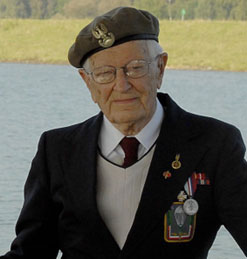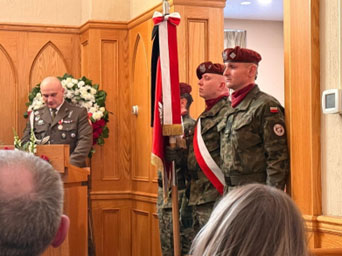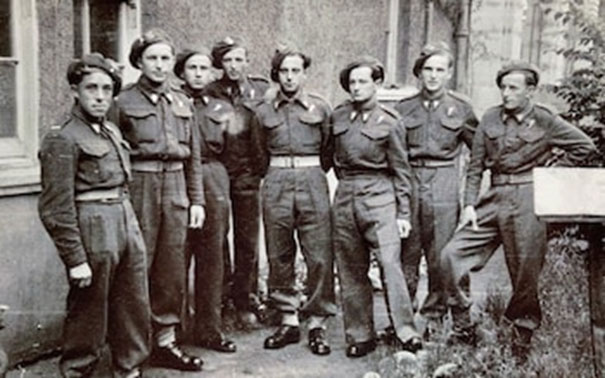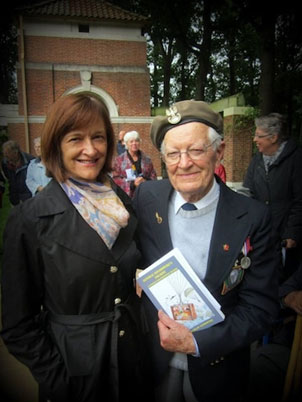Bolesław Ostrowski, 1919 – 2025
 He literally fell out of the sky and landed on September 21, 1944 with about 1,000 Polish paratroopers in the countryside southeast of Driel.
He literally fell out of the sky and landed on September 21, 1944 with about 1,000 Polish paratroopers in the countryside southeast of Driel.
Bolesław “Bolek” Ostrowski passed away on March 13, 2025 at the age of 105. He was the last surviving veteran of the 1st Polish Independent Parachute Brigade. Representatives of the 6th Polish Parachute Brigade from Krakow, the Polish Embassy in Canada and the Polish Veterans Organization attended his funeral.
Bolek had made a world trip between his birth region, now Ukraine, and the landing grounds at Driel. He died in Canada, where he had lived since the 1950s.
 This article describes in broad terms the life story of Bolesław Ostrowski.
This article describes in broad terms the life story of Bolesław Ostrowski.
Bolek’s story is typical of that of many Polish veterans. They contributed to the fight for a free Europe in a roundabout way. Many of them never returned to their homeland.
Bolek survived all the shelling during his deployment for the Polish army. Everyone can imagine the horrors that the Allied soldiers experienced during Operation Market Garden in the Battle of Arnhem. Bolek himself said in an interview about this: “I have lived a thousand years”. (The Missasauga News 31-12-2015).
During the interview in July 2023, he chose the words “it was worth our effort” to make his feelings about the battle tangible.
Biography:
Driel, September 1944
After days of preparation and two postponements, the brigade finally left Saltby Airfield near Leicester in England for Driel on September 21 at around 2 p.m. Operation Market Garden was already in full swing. Bolek was 25 years old when he landed in Driel as a radio operator.
The landing zone changed a few days before their arrival. It became Driel. The order was to cross the Rhine as quickly as possible with the ferry that would be there to support the 1st British Airborne Division in the battle. That turned out to be impossible, because the ferry had disappeared. This was because the ferryman had cut the cables of the ferry to prevent use by the Germans. The request to the commander of the 30th Army Corps of the Allies to provide boats for the crossing always ended in disappointment. They did not arrive or only a few.
There was no wind during his jump; he had an excellent landing despite heavy shelling by the Germans. His radio set had landed nearby, as had the two-wheeled trolley to move the transmitting equipment.
Four men were needed to transport the heavy equipment to the assembly point at the Baarskamp farm on the edge of the village. The carts carrying the communication equipment proved difficult or even impossible to move in the marshy fields near Driel and the soft floodplains of the Rhine.
The radio set of Bolek and his team proved to be the only reliable connection with the British troops in Oosterbeek.
When the Poles reached the Rhine and discovered that they could not cross it because the ferry was no longer moored, they retreated to Driel in the early morning of the next day, 22 September, where they dug in. Sosabowski considered the position at a farm situated on the dike too dangerous to remain there any longer. Without the Germans noticing, the Poles moved to the village of Driel at dawn. Sosabowski’s headquarters was set up in the farm of the De Beijer family.
During the night of 23 to 24 September, the brigade moved the radio set again to the Rhine dike, where the crossing of the river had to take place. But that same night Bolek returns with his equipment to the headquarters in Driel.
About 200 Polish soldiers managed to reach the other side of the river during the fighting to reinforce the besieged British.
Of the 1568 Polish soldiers, only 1003 were dropped in Driel. The remaining soldiers returned to England, due to a communication failure among the pilots about the weather conditions. These were mainly soldiers from the 1st and 3rd battalions.
For a long time there was uncertainty about their fate. A few days later they were dropped at Grave and brought to Driel.
A message came from the army command that the British Airborne troops would withdraw in the night of 25 to 26 September and cross the Rhine to Driel. The Polish brigade would leave Driel the next morning, 26 September. It was nine o’clock in the morning when they left Driel. They could not turn the tide of the battle. In the afternoon they arrived in Nijmegen, exhausted. To their disappointment, they did not return to England immediately but were transported to their new positions in Herpen, Ravenstein to Overlangel and Neerloon that same day to guard airfields.
At the beginning of October, they were taken to Belgium and finally arrived in England by ship on 12 October 1944.
Later, from May 1945, the Poles were deployed as part of the Allied occupation army in Germany. In April 1947, the Polish army was relieved of its tasks in the occupation army and demobilized. Bolek survived all the shelling during his deployment for the Polish army. Everyone can imagine the horrors that the Allied soldiers experienced in the Battle of Arnhem.
Born in Dubno, then still in Poland.
Bolesław “Bolek” Ostrowski was born on 4 July 1919 on a farm near Dubno in the region of the same name, which was then still in Poland. The Russians took the region in September 1939. The Dubno region is now part of Ukraine. The quiet border town was flooded by a stream of refugees from the west during the German Blitzkrieg in September 1939.
Life there was difficult under the Russian occupation. Bolek was trained as a teacher under strict supervision of the Russians. After a short period as a teacher in the occupied Czech Republic, he was called up to serve in the Red Army in March 1941.
He traveled by train with many other conscripts to the east, where he was trained as a radio operator.
Within the Red Army, people began to doubt the loyalty of the Polish soldiers to the Soviet Union. That is why the army leadership decided to deport these soldiers to labor camps in Siberia. A very difficult period followed with one main goal: survival.
In mid-February 1942 he heard that General Sikorski was looking for recruits in England for the Polish army to be set up in the USSR. Bolek was also allowed to join the Polish army in exile. In March 1942 Bolek leaves for Kazakhstan. His journey does not stop there. He travels halfway across the world, from Asia, the Middle East, South Africa, South America to Canada, finally arriving in Greenock in Scotland on 6 October 1942. There he joins the 1st Polish Independent Parachute Brigade.
 Bolek Ostrowski, third from right, before Driel
Bolek Ostrowski, third from right, before Driel
From that time on, the Poles trained as paratroopers with the ultimate goal of “taking the shortest route to Poland” and helping to liberate the fatherland. But the Allied High Command had other plans. The Polish paratroopers were added to the 1st British Airborne Division to be deployed in Operation Market Garden.
Bolek trained intensively to be well prepared for his role as a radio operator and paratrooper.
Finally, the Polish troops left for their target near the village of Driel on 21 September 1944.
After the Second World War
Bolek will not return to Poland. The country was once again occupied by the Soviet Union and, like most other soldiers in his brigade, he was no longer welcome in communist Poland. Poland was no longer a free country.
Bolek married Maria Wypijewska in Coventry on 20 January 1951. Their son Johnny was born a year later, followed by Roman in 1954 and Barbara in 1955.
The company, Massey Ferguson, where he worked in England, also had a branch in Canada. The family then decided to emigrate to Canada in 1958 and start a new life there.
Bolek retired in 1984.
Bolek returned to Driel for the first time in 1989 for the commemoration of the Battle of Arnhem and for the twelfth and final time in 2014. His son John, daughter Barbara and grandson accompanied him regularly.
 Bolek Ostrowski with his daughter Barbara
Bolek Ostrowski with his daughter Barbara
In the five days of battle in Driel, 97 of his comrades were killed. The village was devastated by the violence of war. Nevertheless, after the war, the veterans were welcomed with open arms by the people of Driel and taken into their hearts. That is still the case now.
Fifty years after the war, Poland regained its freedom. Veterans from all over the world, including Bolek, walked in a victory parade through Warsaw.
After the war, the English suggested that the Polish paratroopers were to blame for the failure of operation Market Garden. The brigade was eventually restored to its former glory when Queen Beatrix awarded the brigade the highest military distinction in the Netherlands, the Order of William, in May 2006 for their role in the liberation of the Netherlands and in particular for their contribution to operation Market Garden.
On 19 July 2023, on the occasion of his 104th birthday, the chairman of the Driel-Polen foundation presented him with a bouquet of flowers via a video (www.driel-polen.nl/en/bolek-ostrowski-viert-zijn-104e-verjaardag/ ) call. He clearly enjoyed it.
The last 2 years he stayed in a nursing home in Canada.
Author: Rob Snelders
Sources:
- General Sosabowski Tourist, A Polish Paratrooper’s Memoir, Boleslaw Ostrowski
- The Poles of Driel, George F. Cholewczynski
Request for rehabilitation to the British government:
There is “no time to lose” for the last surviving Polish veteran of the Battle of Arnhem. This is what the mayors of Overbetuwe, Arnhem, Renkum and Ede and the Driel-Polen Foundation wrote an open letter to the new Prime Minister Starmer of the United Kingdom in July 2024.
More than eight decades after Operation Market Garden, the British are taking a major step towards restoring the honour of the Polish paratroopers who fought at Driel and Arnhem. “The United Kingdom expresses its appreciation and recognition for the courage and dedication shown by the 1st Polish Independent Parachute Brigade during Operation Market Garden”, the British government said on its website at the end of January 2025.
In December 2024, Bolek received a letter from the British Minister of Defence expressing great appreciation for his efforts and those of the brigade. It is a pity that he will not be able to experience the British government’s intention to give a military gift to the successors of the 1st Polish Independent Parachute Brigade, the 6th Airborne Brigade in Krakow, and the extra attention they wish to give to General Sosabowski.
Bolesław Ostrowski, born July 4 1919, died March 13 2025
